 |
|---|
Elections in Togo take place within the framework of a presidential system. Both the President and the National Assembly are directly elected by voters. Togo is a one party dominant state with the Union for the Republic in power.
 |
|---|
Elections in Togo take place within the framework of a presidential system. Both the President and the National Assembly are directly elected by voters. Togo is a one party dominant state with the Union for the Republic in power.
Following World War II, the territory began to elect members to the French National Assembly. The first of these elections took place on 21 October 1945, with French Togoland and neighbouring Dahomey combined into a single constituency. Two MPs were elected using separate electoral colleges for French citizens and Africans. A by-election was held in February 1946 after the MP elected by the First College (French citizens) died in December 1945, with a second full election for the combined constituency held in June 1946. By the November 1946 elections, Togo had become a single-member seat, and Martin Aku of the Committee of Togolese Unity (CUT) was elected.
A Representative Council was established in the same period and was first elected in December 1946. [1] The CUT emerged as the largest party, winning 14 of the 24 seats in the Second College. French National Assembly elections were held again in 1951, with the result being a reversal of the November 1946 elections, Nicolas Grunitzky of the Togolese Party of Progress (PTP) defeating Aku. Representative Assembly elections were held later in the year and saw the CUT reduced to a single seat, with the Union of Chiefs and Peoples of the North (UPCN) and its sister party the PTP winning 23 of the 24 Seconcd College seats. [1] Due to political restructuring of the territory, a Territorial Assembly was created shortly afterwards and elections held in March 1952; the UPCN won half of the 30 seats, with the CUT–Juvento alliance winning nine and the PTP six.
In the 1955 elections the UPCN and PTP won 15 of the 30 seats each, with the CUT boycotting the vote. [2] The following year Grunitzky ran unopposed for the French National Assembly seat. Parliamentary elections in 1958 led to a victory for the CUT, which won 29 of the 46 seats.
General elections were held in 1961, the first time the country's president had been directly elected. Sylvanus Olympio of the Party of Togolese Unity (PUT, the renamed CUT) was the only candidate, whilst the PUT was the only party to put forward candidates in the National Assembly election, winning all 52 seats. Following a coup in 1963 that ousted Olympio, early general elections were held, with Grunitzky as the sole presidential candidate. Four parties (the PUT, Juvento, the Democratic Union of the Togolese People and the Togolese People's Movement) ran unopposed on a combined list for the National Assembly elections, each taking 14 of the 56 seats.
Following another coup by Gnassingbé Eyadéma in 1967, elections were not held again until 1979 and the country became a one-party state under the Rally of the Togolese People (RPT); General elections that year saw Eyadéma re-elected unopposed as President and the RPT win all the National Assembly seats. Parliamentary elections were held under this system in 1985 and 1990, with Eyadéma re-elected as President in 1986.
Mulit-party democracy was reintroduced in 1992 and presidential elections held in 1993. A boycott by the two main opposition parties saw Eyadéme re-elected with 96.5% of the vote. Although parliamentary elections the following year saw the RPT defeated by the Action Committee for Renewal (CAR), Eyadéma refused to appoint CAR leader Yawovi Agboyibo as Prime Minister, instead giving the post to Edem Kodjo, leader of the CAR's junior ally, the Togolese Union for Democracy; this caused a split in the coalition, and the RPT joined the government in their place.
Eyadéma was re-elected again in 1998 with 52% of the vote and the RPT won 79 of the 81 seats in the National Assembly in parliamentary elections the following year amidst a boycott by eight opposition parties. The party retained its majority in the 2002 elections, which were boycotted by nine parties, and Eyadéma was re-elected for a fifth time in the 2003 presidential elections with 58% of the vote.
Following Eyadéma's death in 2005, early presidential elections were held in the same year, and were won by his son Faure Gnassingbé, who received 60% of the vote. The RPT subsequently won 50 of the 81 seats in the 2007 parliamentary elections. Gnassingbé was re-elected in 2010 with 61% of the vote. In 2012 he dissolved the RPT, replacing it with the Union for the Republic (UNIR). UNIR went on to win 62 of the 91 seats in the 2013 parliamentary elections. Gnassibngé was re-elected again in 2015 with 59% of the vote.
The President of Togo is elected by plurality voting. [3]
The 91 members of the National Assembly are elected by closed list proportional representation in 30 multi-member constituencies of between two and ten seats; seats are allocated using the highest averages method and there is no electoral threshold. [4] Parties must submit lists with double the number of candidates for the number of seats being contested in order to provide replacements.
During the colonial era, voters participated in French constitutional referendums in 1945, May 1946, October 1946 and 1958. Unlike in other French territories, voting in the 1958 referendum was restricted to French citizens only.
A referendum on remaining a United Nations Trust Territory or becoming an autonomous region within the French Union was held in 1956 and resulted in a large majority in favour of the French option. However, the results were rejected by the United Nations General Assembly as the referendum had not included the option of independence and opted to continue with the trusteeship.
A 1961 referendum approved constitutional amendments allowing for direct elections for the president and the creation of a presidential republic. Further constitutional amendments were approved in a 1963 referendum following the coup.
In 1972 a referendum was held on whether 1967 coup leader Eyadéma should remain in power, and was approved by 99.9% of voters. Constitutional amendments approved in a 1979 referendum made the country a one-party state. This was reversed by changes approved in a 1992 referendum.
The history of Togo can be traced to archaeological finds which indicate that ancient local tribes were able to produce pottery and process tin. During the period from the 11th century to the 16th century, the Ewé, the Mina, the Gun, and various other tribes entered the region. Most of them settled in coastal areas. The Portuguese arrived in the late 15th century, followed by other European powers. Until the 19th century, the coastal region was a major slave trade centre, earning Togo and the surrounding region the name "The Slave Coast".

Politics of Togo takes place in a framework of a presidential republic, whereby the President of Togo is both head of state and head of government. Executive power is exercised by the government. Legislative power is vested in both the government and parliament. After independence, the party system was dominated first by the authoritarian Rally for the Togolese People, and later by its successor party, Union for the Republic.

Gnassingbé Eyadéma was a Togolese military officer and politician who was the president of Togo from 1967 until his death in 2005, after which he was immediately succeeded by his son, Faure Gnassingbé.
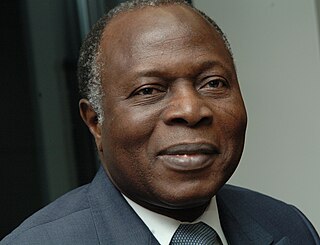
Koffi Sama was the Prime Minister of Togo from 29 June 2002 to 9 June 2005.

Faure Essozimna Gnassingbé is a Togolese politician who has been the president of Togo since 2005. Before assuming the presidency, he was appointed by his father, President Gnassingbé Eyadéma, as Minister of Equipment, Mines, Posts, and Telecommunications, serving from 2003 to 2005.

Édouard Kodjovi "Edem" Kodjo, was a Togolese politician and diplomat. He was Secretary-General of the Organisation of African Unity from 1978 to 1983; later, in Togo, he was a prominent opposition leader after the introduction of multi-party politics. He served as Prime Minister from 1994 to 1996 and again from 2005 to 2006. Kodjo was President of the Patriotic Pan-African Convergence (CPP). Kodjo died on April 11, 2020, in Paris.
Fambaré Ouattara Natchaba was a Togolese politician. He was the President of the National Assembly of Togo from September 2000 to February 2005. He was a prominent member of the ruling Rally of the Togolese People (RPT) and a member of the Pan-African Parliament representing Togo.

Nicolas Grunitzky was the second president of Togo and its third head of state. He was President from 1963 to 1967. Grunitzky was Prime Minister of Togo from 1956 to 1958 under the French Colonial loi cadre system, which created a limited "national" government in their colonial possessions. He was elected Prime Minister of Togo —still under French administration— in 1956. Following the 1963 coup which killed his nationalist political rival and brother-in-law Sylvanus Olympio, Grunitzky was chosen by the military committee of coup leaders to be Togo's second President.
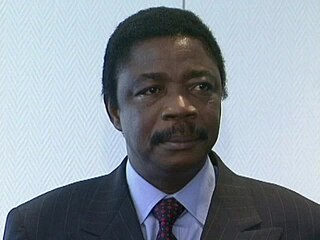
Kwassi Klutse was a Togolese politician who was the Prime Minister of Togo from 20 August 1996 to 21 May 1999.
Gilchrist Olympio is a Togolese politician who was a long-time opponent of the regime of Gnassingbé Eyadéma and was President of the Union of Forces for Change (UFC), Togo's main opposition party from the 1990s til 2013. Olympio is the son of Sylvanus Olympio, Togo's first President, who was assassinated in a 1963 coup. He is now an ally of the current regime of Faure Gnassingbe, the son of the late President.
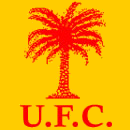
The Union of Forces for Change is an opposition political party in Togo. The President of the UFC was Gilchrist Olympio and its Secretary-General was Jean-Pierre Fabre until 10 August 2010. Olympio is the son of the first President of Togo, Sylvanus Olympio, who was assassinated in a 1963 coup. On 10 August 2010, Jean-Pierre Fabre was elected as President of the party.

The Rally of the Togolese People was the ruling political party in Togo from 1969 to 2012. It was founded by President Gnassingbé Eyadéma and headed by his son, President Faure Gnassingbé, after the former's death in 2005. Faure Gnassingbé replaced the RPT with a new ruling party, the Union for the Republic (UNIR), in April 2012, dissolving the RPT.
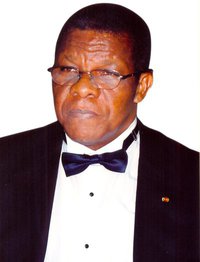
Joseph Kokou Koffigoh is a Togolese politician, human rights activist, and a poet who served as Prime Minister of Togo from 27 August 1991 to 23 April 1994. Elected as Prime Minister by the opposition-dominated National Conference in 1991, Koffigoh was given full executive powers and tasked with overseeing a transition to multiparty elections. Beginning in December 1991, however, President Gnassingbé Eyadéma increasingly reasserted his authority at Koffigoh's expense. Although Koffigoh remained in office, the opposition eventually abandoned him, feeling he had become too cooperative with Eyadéma.
Yawovi Madji Agboyibo was a Togolese attorney and politician. He served as Prime Minister of Togo from September 2006 to December 2007 and was National President of the Action Committee for Renewal (CAR), an opposition political party, from 1991 to 2008. He was the Honorary President of the CAR.

Presidential elections were held in Togo on 21 June 1998. Incumbent President Gnassingbé Eyadéma, in power since 1967, was re-elected with 52% of the vote according to official results. The opposition disputed this and claimed that Gilchrist Olympio of the Union of the Forces of Change (UFC) had won.
March 2000 passed without presidential action. New legislative elections were ultimately rescheduled for October 2001. Because of funding problems and disagreements between the government and opposition, the elections were again delayed, this time until March 2002.
Dama Dramani is a Togolese politician who was the President of the National Assembly of Togo from 2013 to 2018. He was Secretary-General of the Rally of the Togolese People (RPT), the ruling party, from 2003 to 2006, and following the 2007 parliamentary election he was President of the RPT Parliamentary Group in the National Assembly.

Presidential elections were held in Togo on 4 March 2010. Incumbent President Faure Gnassingbé—who won his first term in a presidential election that followed the death of his father, long-time President Gnassingbé Eyadema, in 2005—faced radical opposition candidate Jean-Pierre Fabre, the Secretary-General of the Union of the Forces of Change (UFC), as well as several minor opposition candidates.
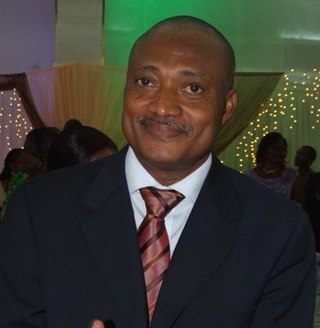
Jean-Pierre Fabre is a Togolese politician and the President of Togo's main opposition party, the National Alliance for Change.

A constitutional referendum was held in Togo on 30 December 1979, alongside simultaneous general elections. The changes to the constitution would establish the Third Togolese Republic and make the country a presidential republic and a one-party state, and were approved by 99.87% of voters with a 99.4% turnout. The constitution came into force on 12 January 1980.